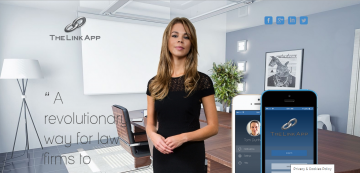Law firms are moving towards the “Martini” option of working – anytime, any place, anywhere.
So says Andrew Neill, global programme manager at London law firm Withers, who notes there have been big changes in the legal profession’s attitude to mobile over the last decade or so.
“Whereas, previously, law firms would give their lawyers BlackBerry phones and laptops, and secure the perimeter of their practices with firewalls to protect the data that was inside the office, now there is a lot more focus on lawyers not being in the office.
“And importantly, they are not on a single uniform device – they are on an iPhone or iPad, or any number of devices,” he says.
“There are still some technophobic lawyers – those who insist on e-mails being printed and stacked on their desks in the morning – but they are far fewer than they were even five years ago.”
Back in the dark ages of technology evolution, the UK legal profession was almost totally unified in its mobile device of choice: BlackBerry ruled the landscape. Lawyers are still doing their best to prop up the financially challenged Canadian company, but not in the numbers and with the enthusiasm of a decade ago.
There are still some technophobic lawyers – those who insist on e-mails being printed and stacked on their desks in the morning
That is by no means the result of declining interest in mobility as the subject is increasingly on the agenda for the legal profession. It’s just that lawyers, in common with other professions, are finding iPhones and other, Android devices better suited to a growing range of general and legal profession bespoke applications.
BRING YOUR OWN
Proliferation of mobile use has created problems for law firms. Management committees are in danger of losing control over the gadgets lawyers carry in their briefcases and handbags as the phenomenon of bring your own device (BYOD) takes hold in the legal profession, blurring distinctions between work and personal mobility.
But increased mobility raises serious concerns over client confidentiality and the spectre of cyber security. Any organisation working with large amounts of confidential data will need to consider data security very carefully before implementing social technologies and BYOD more broadly.
Indeed, drafting a BYOD policy should be at the top of every law firm management committee agenda, says Kenneth Mullen, a technology partner at Withers. He sets out core watchwords as compatibility, security and responsibility.
That translates into law firms taking control over the type of devices lawyers use; ensuring individual lawyers do not download data on to a device locally – in other words, data must be encrypted centrally before being downloaded; and dictating that lawyers must not share devices with family and friends.
Increased mobility raises serious concerns over client confidentiality and the spectre of cyber security
“Lawyers must not be allowed to plug in any old device to a law firm’s system,” says Mr Mullen. “Devices need to be compatible with a firm’s software for ease of integration. Also, management needs to know exactly what people are using, not least because there is a support issue. If the IT team has to deal with multiple devices, including some sort of obscure Chinese-make of phone, it is difficult for them to be adequately resourced.”
Increasingly, lawyers may be bringing their own devices to work, but are software manufacturers providing bespoke legal profession tools for that mobility?
A glut of startup companies, producing time-recording, document management and sharing applications, sprang up, with many disappearing. But larger providers, such as LexisNexis and Intapp, are catering for the mobile lawyer market, at least to some extent.
Applications can track documents a lawyer opens on a mobile device, telephone calls made or taken and web-browsing for research. That information then automatically generates data for the billing system time recorder.
And lawyers are using other mobile software tools, according to legal profession technology guru and author of Tomorrow’s Naked Lawyer: NewTech, NewHuman, NewLaw, Chrissie Lightfoot. “Many use voice-activated digital assistants, such as Siri, Google Now and Cortana, on their smartphones to answer queries, send messages, make calls, and schedule meetings and reminders,” she says.
Most cloud-based practice management systems allow lawyers to plug in on the move from multiple devices. “Clio is proving particularly popular, as is the Peppermint App Shop,” says Ms Lightfoot.
Driving demand is an ever-rising tide of information. As Ashley Hurst, a technology partner at London solicitors’ firm Olswang, explains: “Lawyers are overloaded with e-mails, many of which would have a better home on a searchable, mobile-friendly platform that can be tailored to the individual user. Technology exists for law firms to have a document repository, extranet, wiki and knowledge-sharing portal all within one platform, and available on any device anywhere in the world.”
But some specialist lawyers remain sceptical about the advances of bespoke legal profession applications. They maintain that arguments around the advantages of lawyer mobility should not be over-egged.
“Private practice lawyers are becoming a bit more mobile; in-house lawyers considerably more, depending on the sector,” says Mark Watts, a technology partner at City law firm Bristows. He claims that applications pitched at legal practices focus on relatively basic tasks, such as time-recording.
SMALL SCREEN
“Proliferation of apps in the legal sector isn’t that great because of the job lawyers do,” Mr Watts says. “When it comes to things, such as drafting documents and marking them up, it’s quite hard to do that on a mobile. You can get away with it at a push on a tablet, depending on the type of documents being reviewed. But trying to do anything meaningful in terms of legal work on something as small as that is difficult. So there is a natural disincentive to developing apps in this field.”
However, he does not rule out continued development of legal profession niche apps designed to manage practical aspects of practice, for instance, staying in contact with clients. Nonetheless, in common with others, Mr Watts returns to security issues.
“The thing that potentially kills lawyer mobility,” he says, “is the still significant client confidentiality concern. Whether those concerns are real or imaginary is another question. In my view, the cloud is more secure than the infrastructure at most law firms.”
ONLINE FOR LAWYERS AND CLIENTS
Tech advances are not solely focused on law firm’s internal systems – there are new client-facing products aimed at businesses and individuals
BIDDING IN HIGH STREET
Launched last November, LegalProposals.com aims to reduce any intimidation ordinary people may feel when searching for a law firm. Director Mark Needham explains: “Clients answer five online questions and, on the basis of the answers, solicitors will put together an initial quote for the business. The bids set out fees and disbursements, which are e-mailed to the client.”
WORKING FOR SMEs
Lexoo is the latest of several online legal tendering sites, this time pitched at small and medium-sized enterprises (SMEs). The average value of work falls between £1,000 and £2,000, but that often leads to larger instructions of up to £10,000. Co-founder Daniel van Binsbergen says: “Clients describe their instructions and we approach four law firms we feel are a good fit for that work, and we ask those lawyers to provide a quote. We also give a steer on the range of standard fees for that type of work.”
KEEPING CLIENTS POSTED
The Link App is in beta-testing for release in June. The brainchild of Lauren Riley, a family law solicitor at St Albans law firm Labrums and a contestant on the most recent series of BBC TV’s The Apprentice, it is a communications tool for law firms to stay in contact with clients through desktops or mobile devices. For property deals, the app pushes notifications of searches and other processes direct to a client’s mobile and keeps a timeline of progress.
BRING YOUR OWN




